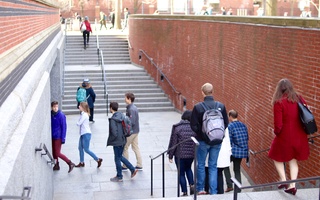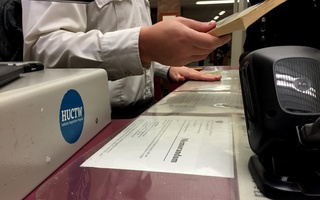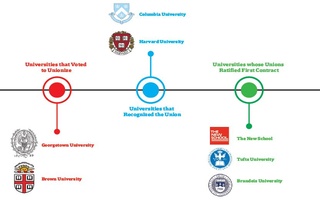{shortcode-b745cd6ea6c066d506947ddaefe9de6cbe2b2040}
Graduate students in STEM departments shared stories about sexual harassment in the lab, issues with advisers, and unsafe working conditions at a discussion hosted by the graduate student union Wednesday night.
The event, called “Power in the Lab: A STEM Grad Student Conversation,” focused on power dynamics within research labs. Harvard Graduate Women in Science and Engineering, Chemistry Graduate Student and Postdoc Council, the Physics Graduate Student Council, and the Applied Physics Graduate Student Council — all affiliated with disciplines that had students generally opposed to the union before last April’s election — co-sponsored the two-hour event.
The conversation drew 25 participants, representing 10 distinct fields in STEM and the social sciences, from physics to economics.
Discussion leaders and graduate student union bargaining unit members Jocelyn Fuentes and Cole M. Meisenhelder started the meeting by sharing the Office for Sexual Assault Prevention and Response hotline before arguing that STEM fields are uniquely susceptible to “dysfunctional” power dynamics. They spoke on issues of authorship, fickle research funding, overbearing principal investigators, and a culture of stoicism and isolation.
“A lot of people have managed to get to Harvard by ‘getting along’ in the situation they are put in,” Meinsenhelder said.
He discouraged graduate students in STEM from resigning themselves to what they see as indignities and instead advised attendees to change cultural norms and challenge established Ph.D. advising structures when necessary.
Throughout most of the event, Meisenhelder and Fuentes invited participants to share testimonials in an effort to create a more supportive and open STEM graduate student community.
Several participants said they were forced to accomodate more senior lab members. Participants also took issue with the fact that graduate students’ right to neutral third-party arbitration does not apply to sexual harassment, discrimination, and bullying complaints.
Throughout nine bargaining sessions, the union has repeatedly asked Harvard to replace its current sexual harassment response policy with a neutral third-party arbitration policy, which puts the judgement of the facts and final verdict outside of the University’s control, but often results in necessary meetings between accuser and accused. The University has opposed such a policy and has instead suggested that union representatives be appointed to committees that could recommend changes to the University’s current Title IX policies.
Meisenhelder said the union held the event to address issues that disproportionately affect graduate students in STEM departments — many of whom did not support unionization.
“I think that while the union was a divisive issue in some departments, there was always strong support from members of every department, and we’ve been building with those members throughout,” said Meisenhelder. “We’re always trying to expand our membership, to make everyone as welcome in the union as possible.”
“We have a large number of scientists in the union and we’ve always considered them an important part of the union,” he added. “I think this is an important way of trying to make sure we’re addressing all the needs of our members.”
Earth and Planetary Sciences student Aleyda M. Trevino and Biophysics student Frederick B. Shipley said the event left them with a better impression of the union.
“I think it’s become evident that the union has been working towards considering the rights of minorities that are in problematic situations and getting them more support,” Trevino said.
“This event exactly addresses our union's original campaign issues and my reasons for becoming involved in our union: power dynamics in our lab spaces affect people who are vulnerable due to their immigration status and gender-based harassment,” Shipley said. “Who is going to have the most trouble saying no to their adviser or labmates? A US citizen or someone on a visa?”
In the same vein, Fuentes stressed the importance of events like “Power in the Lab.”
“It’s a community space. The only way you can learn about what’s going on in campus is to have people talk to each other so that people can know what else is going on,” Fuentes said. “That requires people getting together.”
— Staff writer Juliet E. Isselbacher can be reached at juliet.isselbacher@thecrimson.com. Follow her on Twitter @julietissel.
—Staff writer Luke A. Williams can be reached at luke.williams@thecrimson.com. Follow him on Twitter @LukeAWilliams22.
Read more in News
38 Harvard Law School Student Groups Sign Letter Supporting Clerkship Hiring ProgramRecommended Articles
-
 We’re Ready to Bargain for A Better Harvard
We’re Ready to Bargain for A Better Harvard -
 Grad Union, Harvard Head to the Bargaining Table
Grad Union, Harvard Head to the Bargaining Table -
 University and Clerical Union Reach Tentative Agreement
University and Clerical Union Reach Tentative Agreement -
 Two Sessions In, Grad Union Says Bargaining With Harvard Will Be Uphill Battle
Two Sessions In, Grad Union Says Bargaining With Harvard Will Be Uphill Battle -
 Grad Unionization Movement Sees Successes Nationwide As Harvard Begins Bargaining
Grad Unionization Movement Sees Successes Nationwide As Harvard Begins Bargaining













